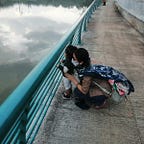It’s been around 18 months since I saw the sea, and D and my escape into the ocean at present is a little board book called On the Beach. A lot of the book is quite unrelatable for someone used to Indian beaches — lifeguards, seals, and surfing — but the sand, blue skies, and water seem to satisfy a baby who’s never seen it in reality. The book has a picture of a few houses near the sea, and D has got into the habit of assigning houses for all our family members. Her two sets of grandparents, two great grandparents and an aunt all get a little dream beach-house. Today, when we asked her in some other conversation where aunty was, she promptly fetched the book and pointed to one of the houses.
How do children go from a blank slate not knowing even how to babble, to stringing together words, small sentences, and grasping a hundred brand new concepts? Of all the things about being a new parent, this has been one of the most fascinating, and fun.
On the one hand, we are trying to guard what we say and swallowing swear words or words that mock others which appear to be the easiest to absorb (the other day she let out a ‘muttaal’ at my dad, having learnt it from my mother).
But on the other hand, every single new word doesn’t cease to excite us as yet. Especially when it’s a word we haven’t used directly with her, and she casually throws it back in some other conversation.
What’s bittersweet about babies this pandemic year is, how many words and concepts they’ve managed to grasp indirectly. In our case, it’s been from books. Without getting to go out much in nature, with no wildlife parks or zoos, D has learned names of most animals, birds, flowers, and objects like trains and aeroplanes completely from various books sourced from online stories and generous cousins.
Our big city life has made it unfortunately easier to show her that buses are bigger than bicycles, or how the lift moves up and down, rather than show her branches of a banyan tree or a horse galloping. Save the occasional sparrow, rare hummingbird, the very occasional squirrel (and thankfully numerous cats, crows, dogs and pigeons), our exposure to nature has been highly limited.
So books it is — for monkeys, fishes, tigers, rabbits, penguins, gorillas, dinosaurs and seahorses. Books it is for rockets, trains, boats and tractors. Books it is even for supermarkets — a recent favourite is a book of stickers where you select each sticker and put it on the correct supermarket shelves. (Since she’s too young to actually stick it in the right place, we have stickers of peas and broccoli and juice bottles all over our sofa, sink, mirror and sometimes our hair).
Being bilingual, we often mix up languages while reading or read in translation making this whole process more fun and whimsical. A poochi grows into a butterfly, horses and maadus walk side by side. A porcupine has a chat with an eli, and while flipping through a second hand Asterix comic, she declared that Obelix is eating thacchi mammam. And in our copy of The Gingerbread Man, the grandmother who the book called ‘nan’ has become ‘nan paati’. (We also have a rabbit paati who wears a nightie, and a thatha farmer who wears overalls and a hat).
We keep wishing she can see these animals and objects come from the pages of book to reality — of course, she’s not likely to see a porcupine in real life anyway, but at least there is some consolation in thinking you might just somehow stumble across one if you have the chance of getting out from the house!
But it’s quite fun to imagine how she’d relate when she actually gets to see these things having been used to a distorted sense of scale all this while — would she know that horses are much bigger than mice and that peacocks actually look pretty different from that slightly misshapen wooden statue in our living room? What would it be like seeing a sheep bleat at a farm rather than making our know-it-all Alexa do it for her in the bedroom? How would she react when she realises that we can’t actually just go to the moon in a rocket?
But for a while more, it’s a world of possibilities. We don’t know that dinosaurs don’t exist any more, or that spotting a tiger in a forest is not really that likely. We don’t know that pigs probably don’t go for picnics with a hamper of cakes. We can imagine music that had the magic to make fish fly and let pigeons grow colourful feathers.
Without these books, I’d have probably been lost for what to talk to D beyond a point, and they’ve opened up a whole world of words. Very soon, she’ll probably talk far more than our minds have patience for, and ask more questions than our brains have answers to.
It’s strange to think that something as mundane as talking, which most of us do through school and college and work and life, day in and day out, is such a precious process when it’s a ‘work in progress’.
The spark of joy that learning a new word gives all of us makes all those poopy diapers quite worth it.
